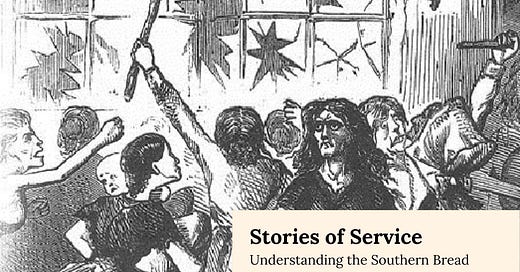Understanding the Southern Bread Riots (17APR23)
Civil Unrest and Women's Role during the American Civil War
During the American Civil War, the Confederate States of America faced numerous challenges, including food shortages, inflation, and economic instability. These challenges led to widespread civil unrest, including the Southern Bread Riots that occurred in March and April 1863.
The Southern Bread Riots were mainly carried out by women who were struggling to feed their families due to rising food prices and shortages. These women, many of whom were widowed or had husbands serving in the Confederate army, became frustrated with the government's inability to address their concerns.
In cities such as Richmond, Virginia, and Mobile, Alabama, women took to the streets and protested against the high cost of bread and other basic necessities. These protests often turned violent, with rioters breaking into stores and seizing food and supplies.
The Confederate government responded to the riots by sending in troops to restore order and imposing martial law. However, these measures were largely ineffective in addressing the underlying issues of food scarcity and inflation.
The Southern Bread Riots highlight the challenges faced by the Confederate government during the Civil War. The government's inability to address the needs of its citizens, particularly women and families, contributed to widespread dissatisfaction and unrest.
The riots also shed light on the role of women in shaping and participating in political movements. Despite the societal constraints placed upon them, women played a significant role in the Southern Bread Riots, using their collective power to demand change and better living conditions for themselves and their families.





